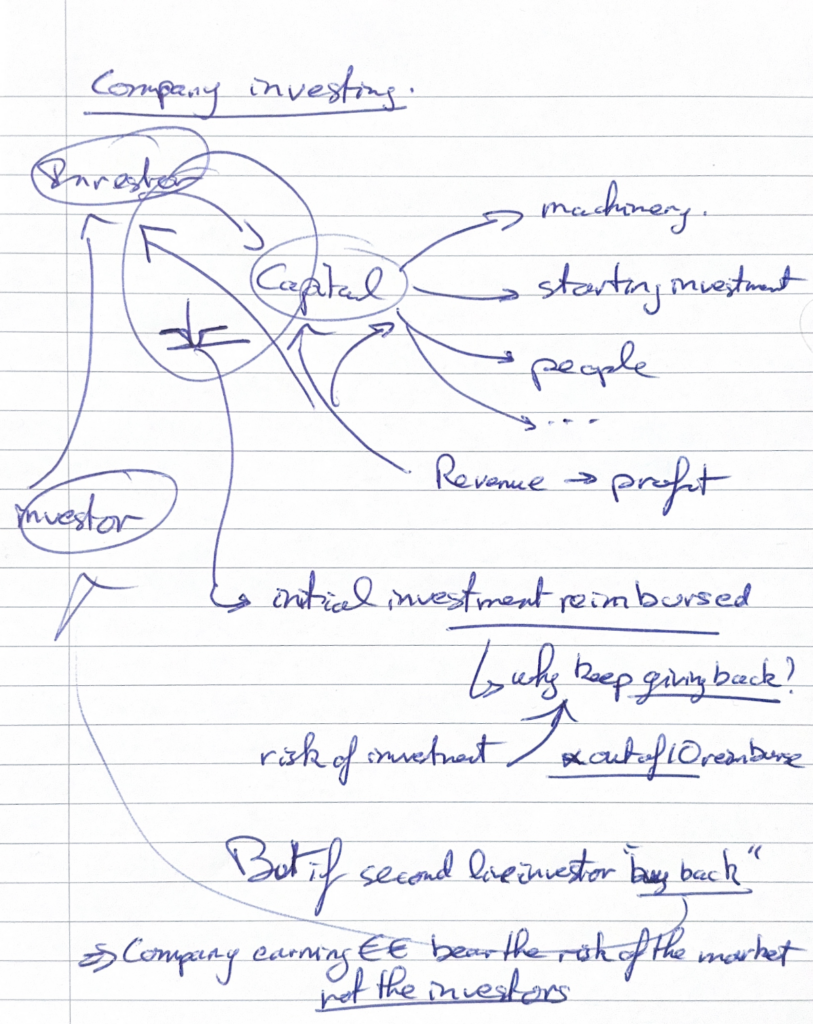
As a manager, I often face a challenging question from my team: why should we, as a team, strive to improve and help the company earn more money if we don’t see all the benefits of our hard work? My usual response is that enhancing performance helps us become more sustainable, hire more people, grow, and achieve our vision. However, if I’m completely honest, it’s also because that’s how companies operate. We aim to work smarter and more efficiently to support parts of the business that aren’t performing well and to meet investor expectations, which helps us keep our jobs.
But this raises important questions: who are these investors, and are they still actively investing in the company? These thoughts crossed my mind last Sunday morning, just before I began writing about how to define the value of a company.
Investor Expectations
At the start of any company, and during its life when fresh funds are needed, initial investors play a key role. These investors usually provide the money needed to get the company going, expecting to be rewarded in return. But how much reward is fair?
Let’s explore this further: investors expect to at least get their money back, adjusted for inflation, and earn a profit. Investing also involves risk. Just as a company might use profits from one area to cover losses in another, investors need to cover potential losses in their portfolios. They can do this by seeking higher returns on riskier investments or spreading their investments to reduce risk.
This raises important questions: how much profit is reasonable? How long should an investment take to pay off? And how can investors sell their investments when they need cash or find the risk too high?
These questions have been addressed by trading shares on the market. But is this system truly beneficial for our economy, and especially for “the people”?
Reassessing Profit Distribution
From the perspective of employees, profit distribution can often seem unbalanced. They see a significant portion of profits going to investors over many years, while they may not directly benefit from the additional profit they work to bring. This can lead to frustration, especially if there’s no system to share profits fairly with the workforce. Without profit-sharing schemes and a say in the direction and choices of the company, employees might feel disconnected from the company’s success and pressured to increase profits ever more, impacting morale and motivation.
On the other hand, when a company has been around for decades and has returned a substantial multiple of the initial investment, the fairness of ongoing returns to investors comes into question. Of course, investors should be rewarded for the risk they take, but as companies mature and have returned a high multiple of the initial investment, the justification for continued returns is lacking. Some argue that long-term investors should reinvest in the company or support its strategic initiatives to justify any return.
These considerations highlight the need to reassess profit distribution to ensure both employees and investors are fairly rewarded for their contributions. Building on the discussion of profit distribution, another critical aspect to consider is the evolving role of investors in a company’s lifecycle.
Rethinking Investor Roles and Company Evolution
As companies evolve, the role of investors can shift significantly. Initially, investors, such as angel investors in a tech startup, provide crucial capital and mentorship, guiding the company through its formative stages. This support is vital for overcoming early challenges and setting the foundation for growth. However, as the company matures, some investors may transition from active contributors to passive shareholders, focusing on trading shares rather than directly supporting the company’s development. This shift raises questions about their ongoing contribution to the company’s success.
While trading shares can be a necessary move for investors seeking liquidity or managing risk, it is not always aligned with the company’s long-term profitability or sustainability. In some cases, investors prioritising short-term gains can inadvertently limit the company’s ability to invest in new assets or reinvent itself. This focus on profit without ongoing capital or expertise contributions can hinder a company’s growth potential. To truly support expansion, new investors and lenders, such as those providing bonds, are often needed to inject fresh capital and strategic guidance. This dynamic prompts us to reconsider the evolving role of investors and how they can best contribute to a company’s sustained success.
It also raises an intriguing question: should we consider changing a company’s status, perhaps transitioning into a cooperative and participatory association once it has returned sufficient value to its investors? There are real examples in this world who took this approach either from the start or as a transition, such as Mondragon Corporation (Spain) or John Lewis Partnership (UK). Should the amount an investor receives when selling their shares reflect the returns they have already gained?
While I don’t have definitive answers to these questions, they are worth pondering as we consider the future of company structures and investor roles.
Conclusion
I think we should reconsider the current model of investment and dividends, especially when investors no longer contribute to the company’s growth and merely draw resources that could be used for future investments. Reflecting on these thoughts, I might seem like an extremist for wanting to change the world I live in, but that’s not the case. I believe in gradual change, allowing ideas to slowly bloom and help improve our society.
So, what could be the next steps? How can we address the challenge of determining fair returns for investors and accurately valuing shares? I invite you to share your thoughts and ideas on these issues. Please feel free to reach out with your insights or any remarks regarding this discussion at night-thoughts@poyer.org.